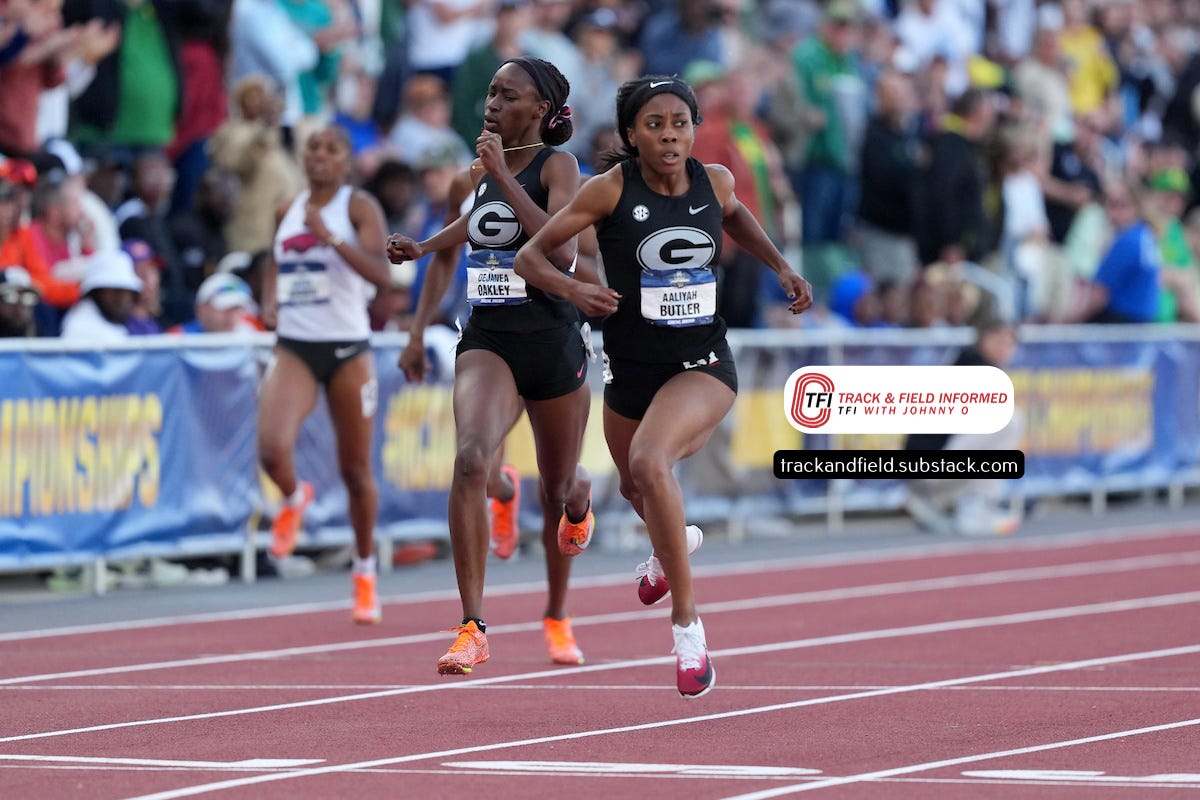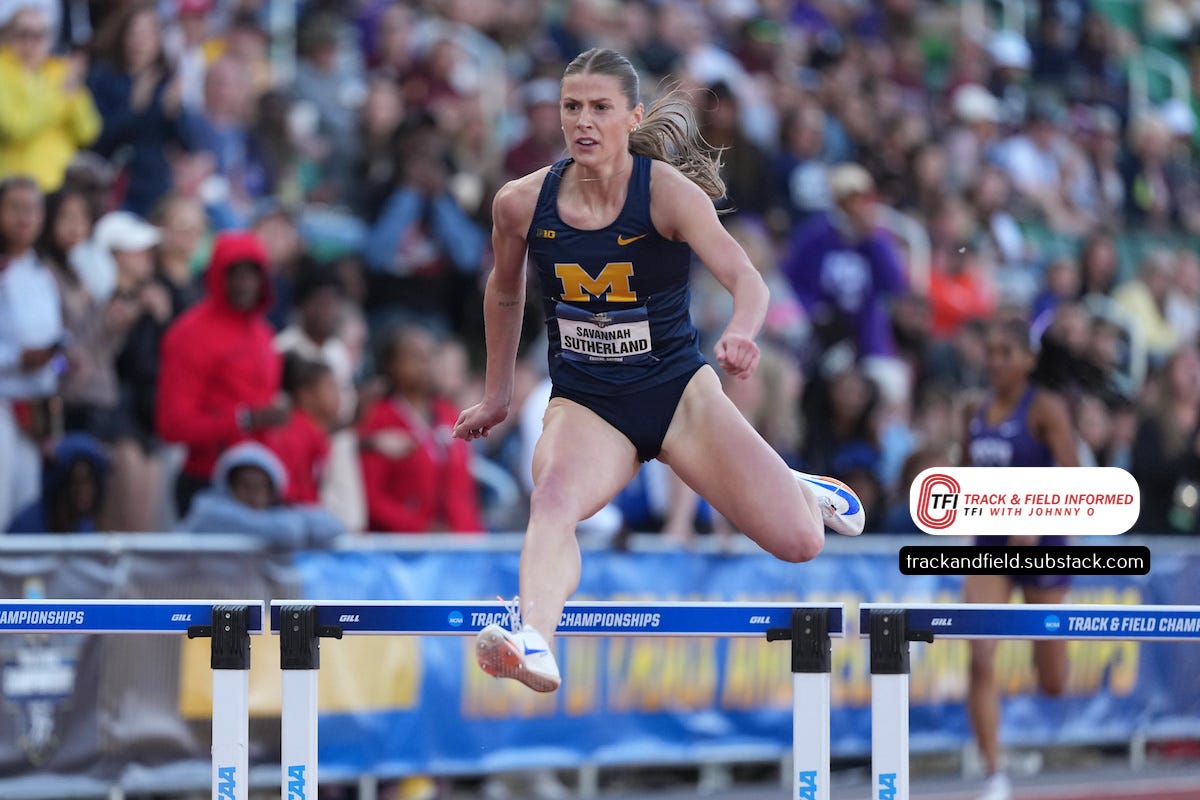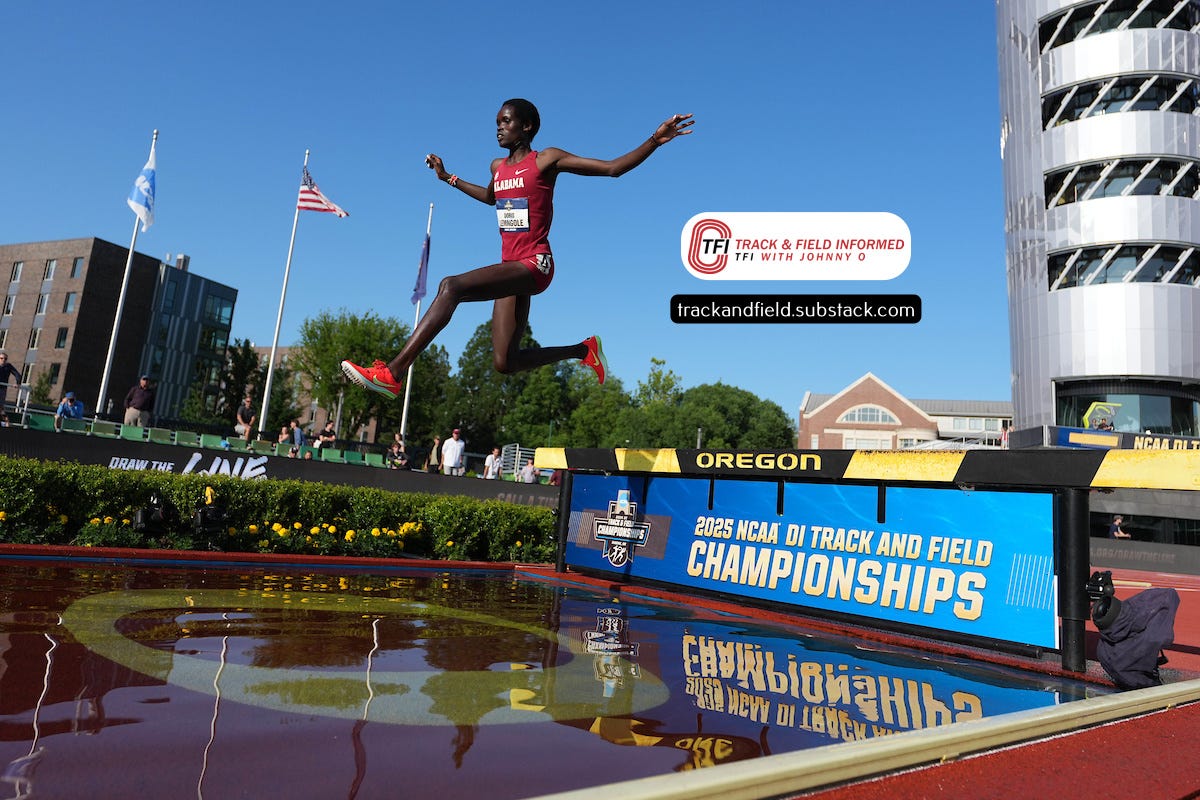Georgia runs away with women's title
Bulldogs win first NCAA track and field championship with 73-47 victory over USC

There was no faltering by Georgia this entire day.
That simple nine-word statement by Dwight Stones of ESPN summed up the outstanding overall performance by the University of Georgia’s women’s team during the final day of the NCAA Track & Field Championships in Eugene, Oregon, on Saturday.
Georgia, paced by a 1-2 finish in the 400 meters and victories in the 4 x 400 relay and the high jump, won its first ever women’s outdoor team title with a 73-47 victory over second-place USC at the University of Oregon’s Hayward Field.
Texas A&M finished third with 43 points, followed by Washington with 31, Illinois with 29½, and Stanford with 29.
On the individual side of things, sophomore Doris Lemngole of Alabama crushed her own collegiate record in the 3,000-meter steeplechase when she ran a yearly world-leading time of 8:58.15 and senior Savannah Sutherland of Michigan ran 52.46 seconds in the 400 hurdles to better the collegiate record of 52.75 that had been set by Sydney McLaughlin of Kentucky during her freshman — and only collegiate — season in 2018.
Georgia had begun the final day of the four-day meet with a 26-16½ lead over second-place Illinois before totaling 47 points in five events.
While Georgia coach Caryl Smith Gilbert was being truthful when she told ESPN’s John Anderson that the Bulldogs had not had a perfect meet, she recognized the fact that they had performed extremely well while totaling 39 points in field events and 34 in track races during the course of the meet.
“It was an amazing performance,” she said. “We had a goal last night to get between 35 and 40 points today. Our field events came through. Running events came through. We’ve been working for this moment the whole season.”
Georgia’s first points on Saturday came in the 400 meters when the junior tandem of Aaliyah Butler and Dejanea Oakley posted personal bests of 49.26 and 49.65 seconds, respectively, while placing first and second in the meet in which the top eight finishers in each event were awarded points on a 10-8-6-5-4-3-2-1 basis.
Butler got out well and had a clear lead entering the home straightaway before bettering her previous best of 49.44 that she had set last year. And Oakley, a transfer from Texas, dipped under 50 seconds for the first time after she had overtaken senior Rosey Effiong of Arkansas in the homestretch.
Butler, who had finished third in the U.S. Olympic Team Trials last year after being eliminated in the semifinals of the NCAA championships, strengthened her hold on fifth on the all-time collegiate performer list with her time on Saturday and Oakley moved to eighth.
Butler also moved into a tie for ninth with Allyson Felix on the all-time U.S. performer list.
While Butler told Anderson that “I knew I could finish really strong, so I just wanted to control the race and bring it home”, an excited Oakley said she was “so happy” to have run under 50 seconds.
“I’m just happy that my teammate was there to push it out, and I just followed.” Oakley said. “And we both ran 49 so that’s really great.”
Georgia’s point total reached 44 points after its 1-2 finish in the 400 and it increased to 50 when freshman Michelle Smith placed third in the 400 hurdles with a time of 55.20 while finishing behind Sutherland, who moved to ninth on the all-time performer list with her 52.46 clocking, and sophomore Akala Garrett of Texas, who ran 54.66.
Sutherland, who had won the 2023 NCAA title before finishing second to Jasmine Jones of USC in last year’s meet, led the race after the first of 10 hurdles and never trailed again. She cleared the first eight barriers leading with her dominant right leg before going to her left leg over the ninth hurdle and then transitioning back to her right for the tenth.
“It was difficult,” Sutherland said about her collegiate best that bettered her Canadian record of 53.26 from last year. “But I just said, ‘Don’t be scared.’ We’ve been putting the pieces together for a long time. I just haven’t had them all fall into place at one moment.
“And so I knew I was ready for something big. I just had to not think about it and let myself do what I knew I could.”

Following the 400 hurdles, Georgia garnered its next points in the high jump and triple jump as Bulldog senior Elena Kulichenko won the former event by clearing 1.96 meters (6 feet 5 inches) and freshman Skylyn Townsend placed sixth in the latter with a personal best of 13.52 (44-4¼).
Kulichenko, who had tied for first place with Rose Yeboah of Illinois last year, defeated her on Saturday by clearing 1.84 (6-½), 1.87 (6-1½), 1.90 (6-2¾), 1.93 (6-4), and 1.96 (6-5) on her first attempts before missing three times at 2.00 (6-6¾).
Yeboah finished second at 1.93 (6-4) with fellow senior Jenna Rogers of Nebraska and junior Alyssa Jones of Stanford placing third and fourth, respectively, after they had each made 1.90 (6-2¾).
Rogers finished ahead of Jones because she cleared that height on her first attempt and Jones needed three tries.
Georgia’s final 10 points came in the 4 x 400 relay in the last event of the meet when Butler, Oakley, Smith, and sophomore teammate Sydney Harris combined for a winning time of 3:23.62.
The Bulldogs was in first place after Oakley and Smith produced a split of 1:42.99 after the first two legs, but Georgia had fallen behind two-time defending champion Arkansas after Harris ran 51.84 on her third carry. However, Butler was credited with a 48.79 split during her anchor leg that saw her run behind Razorback senior Rosey Effiong for the first 300 meters before she began to close in on Effiong coming off the turn and went past her with roughly 65 meters to go.
Arkansas finished second in 3:24.25, followed by USC in 3:26.01 and Texas A&M in 3:27.11.
The team trophy presentation followed shortly after that and in a touching scene, Smith Gilbert became quite emotional when Anderson asked her why she had told all of the assembled team members why she was proud of them.
“I love these kids,” she said before taking few moments to compose herself. “They teach me more about me than I teach them about anything, and they worked so hard and they believed in themselves, and we did it.”
USC, which finished second behind Georgia in the women’s meet a day after its men’s squad had tied Texas A&M for the title, scored all 43 of its points on Saturday in the 100 and 200 meters, and in the 4 x 100 and 4 x 400 relays.
The Trojans started the track portion of the meet with a winning time of 42.22 in the 400 relay that missed the program record by only a hundredth of a second and they capped it with their third-place finish in the 1,600 relay. And in between those two races, USC scored 13 points in the 100 and 14 in the 200.
Sophomore JaMeesia Ford of South Carolina had been the favorite in both the 100 and 200 after running personal bests of 10.87 in the former and 21.98 in the latter in the semifinals on Thursday. But USC senior Samirah Moody upset her for the 100-meter title when both of them were credited with a time of 11.14 — while running into a breeze of 1.4 meters per second — before she won the 200 in 22.21 in a race in which USC sophomore Madison Whyte placed second in 22.23 and Trojan junior Dajaz Defrand finished third in 22.39.
South Carolina had finished second in the 400 relay in 42.40 when Ford had made up a substantial amount of ground on USC’s Jassani Carter during the anchor leg, but it appeared that she might have tweaked a muscle after the 200 and South Carolina withdrew its team from the 1,600 relay when that race was run about 45 minutes later.
The single-best performance of the meet, on either the men’s or women’s side of the ledger, might very well have come from Lemmgole, whose 8:58.15 clocking in the steeplechase was the fastest in the world this year and smashed the previous collegiate record of 9:10.13 that she had set in April.
It also moved her to 11th on the all-time world performer list and to fourth on the all-time Kenyan list in a race in which the top seven finishers set personal bests.
Senior Lexy Halladay-Lowry of BYU placed second in 9:08.68 to crush her previous best of 9:18.05 and sophomore Angelina Napoleon of North Carolina State finished third in 9:16.66 to slash more than 11 seconds off her previous best of 9:27.85.
Their times also made them the second- and fifth-fastest runners in collegiate history while moving them to seventh and 13th on the all-time U.S. performer list.
Defending champion Lemngole and Halladay-Lowry wasted little time in separating themselves from the rest of the field and Lemngole had begun to break away from Halladay-Lowry with four laps left in the race.
Her lead was about three seconds with three laps to go and it grew by roughly a second during each of the next two circuits of the track before Lemngole added five seconds to her advantage during the bell lap.
“I didn’t believe myself,” Lemngole told Anderson when he asked what she was thinking when she realized she had run under 9:00 for the first time. “I was so happy, because I’ve been aiming for this for so long. And yeah, here we come. I’m so happy.”

Junior Roisin Willis of Stanford and senior Cierra Jackson of Fresno State also set meet records while winning the 800 and discus, respectively.
Willis had placed first in the 800 in the NCAA indoor championships as a freshman in 2023, but she had not won a collegiate title since then, although she did have second-, third-, and fourth-place finishes to her credit.
She was in fifth place when senior Michaela Rose of LSU led the nine-runner field through first lap in a brisk 56.09 on Saturday. But she had moved up to third place behind Rose and BYU senior Meghan Hunter coming off the final curve and she won the race going away as her 1:58.13 clocking broke the meet record of 1:58.95 set by Rose in the semifinals on Thursday and was the third-fastest time in collegiate history.
Junior Makayla Paige of North Carolina finished second in 1:58.97 to move to fifth on the all-time collegiate performer list and she was followed by Hunter in third in 1:59.03 and Rose in fourth in 1:59.47.
“The first 200 I felt comfortable, but as we’re coming up to the 400, I see 55….56… So I think, ‘Okay. It’s a little aggressive,’ ” Willis told Anderson. “So I trust myself and know that the race doesn’t start until 150 to go and just wait for that.”
Jackson, who finished 10th in the shot put on Thursday, had not advanced to the NCAA championships in 2023 or ’24 and she had produced three fouls in the discus in the 2022 meet.
However, she unleashed a throw of 65.82 (215-11) on her first throw of the competition on Saturday that broke the meet record of 65.01 (213-3) set by Jorinde van Klinken of Arizona State in 2021 and topped her previous best of 65.60 (214-10) that had placed her second in the Mountain West Conference championships last month.
After her big opening throw, Jackson produced a 58.65 (192-5) effort in the second round before registering fouls in the final four rounds, However, no one was able to catch her as junior Alida van Daalen of Florida finished second at 64.94 (213-1), followed by senior Shelby Frank of Texas Tech at 63.37 (207-11).
Senior Jayden Ulrich of Louisville, the runner-up in both the NCAA championships and the U.S. Olympic Team Trials last year, finished seventh at 60.25 (197-8) after having moved to second on the all-time collegiate performer list in April when she threw 69.39 (227-8) in a meet in Ramona, Oklahoma.
In other track finals on Saturday, Pamela Kosgei of New Mexico won the 5,000 meters to complete a distance double that started with a win in the 10,000 on Thursday, Sophie O’Sullivan of Washington placed first in the 1,500, and Aaliyah McCormick of Oregon was the first performer to cross the finish line in the 100 hurdles.
Kosgei, a freshman, had set a meet record of 31:17.82 in the 10,000, but the first few laps of the 5,000 were particularly slow as Brenda Chepchirchir of Auburn was in the lead when she came through the first kilometer in 3:21.58, which projected to a final time of 16:47.90.
Although the pace picked up some during the next two kilometers, it was still sluggish when Marion Jepngetich, another freshman from New Mexico, led a huge pack through 3,000 meters in 9:35.71.
The pace really did not pick up significantly until there were two laps to go and the lead group still consisted of 15 runners with 600 meters to go. However, Kosgei had taken the lead by the start of the bell lap and no one was able to overtake her as she ran her last 400 meters in 64.47 seconds to finish in 15:33.96.
Junior Vera Sjoberg of Boston University closed well in the final home straightaway to finish second in 15:34.77 and she was followed by sophomore Sophia Kennedy of Stanford in 15:35.08 and Jepngetich in 15:35.14.
O’Sullivan, a senior, is the daughter of Sonia O’Sullivan, a five-time NCAA champion for Villanova and the winner of the 5,000 in the 1995 World championships for Ireland. Sophie won the 1,500 in 4:07.94 on Saturday after leading the last 800 meters of the race.
The opening segment of the contest was not fast as senior Lindsey Butler of Virginia Tech was in the lead when she went through the first 300 meters in 49.33 and the pace had slowed significantly when O’Sullivan led at 700 in 2:03.44.
However, she covered her next lap in 66.08 and her final 400 in 58.42 to finish more than a second ahead of senior Margot Appleton of Virginia, who ran 4:08.99. Northern Arizona senior Maggi Condon had looked superb in winning her semifinal on Thursday and was close behind O’Sullivan starting down the final backstretch, but she began to lose ground to the eventual winner with roughly 220 meters to go and placed third in 4:09.31.

McCormick, a senior, had posted the second-fastest time in the semifinals of the 100 hurdles on Thursday, but Florida freshman Habiba Harris had won the Southeastern Conference title in a yearly collegiate-leading time of 12.62 in mid-May.
However, the final became a much more wide-open affair a minute or two before it began when Harris walked off the track, possibly dealing with an injury that she had sustained while running a leg in the 400 relay.
Senior Yanla Ndjip-Nyemeck of UCLA, who had posted the fastest semifinal time with a personal best of 12.71, got off to a fantastic start in the final, but she clobbered the second hurdle and crashed to the track.
McCormick, who later told Anderson that she “didn’t really care about anything but my lane”, ran a clean race and had a solid margin of victory when she crossed the finish line in 12.81 seconds.
Jaiya Covington of Texas A&M and fellow junior Marcia Sey of Howard finished second and third in times of 12.93 as Covington ran two thousandths of a second quicker than Sey.
Junior Winny Bll of Texas A&M won the triple jump with a first-round effort of 13.96 (45-9¾) while finishing ahead of senior Emilia Sjostrand of San Jose State, who placed second at 13.88 (45-6½), and junior Agur Dowl of Oklahoma, who finished third at 13.77 (45-2¼).
Bll, who had placed 12th in last year’s meet while competing for Oklahoma State, had five other fair jumps during the competition, with her second-best mark of 13.73 (45-½) coming in the sixth round.
Oklahoma junior Pippi Lotta Enok won her second heptathlon title in the last three years on Saturday when her personal best of 6,285 points edged the personal best of 6,256 produced by Notre Dane senior Jadin O’Brien.
Freshman Sofia Iakushina of Texas A&M finished third with 6,058 points after entering the meet as the yearly collegiate leader at 6,260.
O’Brien, the winner of the pentathlon in the last three NCAA indoor championships, had a 25-point lead over second-place Enok after she totaled 3,710 points in the first four events of the heptathlon on Friday.
However, Enok took a 51-point lead in the standings after her top mark of 6.39 (20-11¾) in the long jump gave her 76 more points that O’Brien, who had wind-aided best of 6.15 (20-2¼).
Enok gained another three points in the javelin when her best of 42.89 (140-8) was slightly farther than O’Brien’s 42.75 (140-3).
O’Brien did finish ahead of Enok in the 800 meters when she ran 2:12.42 to the Estonian’s 2:14.12, but the 25 points she gained in that event were not enough to overcome the 54-point deficit she had going into it.
You can click here for the results of the meet.
The next three editions of the NCAA championships are scheduled to be held at Hayward Field, with next year’s meet running from June 10-13.



